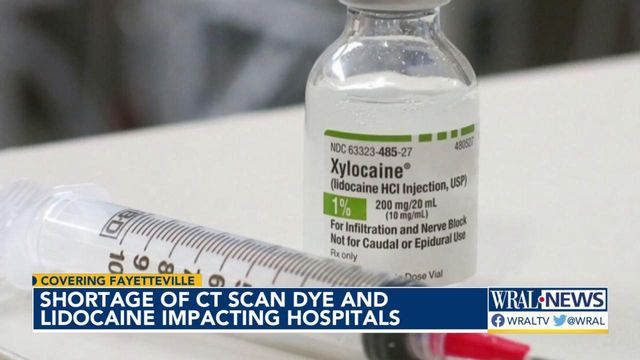NC hospitals adjust during shortage of painkiller lidocaine
The shortage of lidocaine could impact patients by making medications harder to find - or even delaying procedures.
Posted — UpdatedLidocaine has been around for years. Just about every doctor who performs surgery uses it. Pfizer is a big producer of the drug, but supply chain issues have limited supply, causing hospitals to make some medical adjustments.
Lidocaine works as a local anesthetic, which prevents pain by blocking signals on the skin's nerve endings. Some dentists, for example, use lidocaine to help numb a patient's mouth and gums before a procedure. Some over-the-counter medications with lidocaine, such as lidocaine wipes, have been harder to find in some pharmacies.
"It's just a super-basic rub. It'd be like McDonalds running out of cheeseburgers, basically," said a doctor who didn't want to be identified. He says he's already had to cancel surgeries because he can't get his hands on lidocaine.
The shortage of lidocaine could impact patients by making medications harder to find – or even delaying procedures.
"It might delay elective procedures, for example, at dental offices. A lot of times those are more elective procedures, outpatient surgery centers. If it because hard to find you might have to delay cases," says Chris Tart, president of Highsmith Rainey Specialty Hospital.
Hospital administrators think the CAT scan dye shortage may be resolved in about a month, but it may be sometime next year before the supply chain shortage of lidocaine is corrected.
Alan Wolf, a spokesperson for UNC Health, said the system is working to make sure patient care is not affected by "utilizing additional suppliers, starting conservation measures and working with clinical teams to identify alternative products."
"Our pharmacy team will continue to consult with experts across UNC Health as these supply chain and manufacturing delays occur," Wolf added.
Rebecca Richmond, associate chief pharmacy officer of central pharmacy services at Duke University Health System, said Duke University Hospital has felt the impact of the nationwide supply disruption of lidocaine products.
"However, to date we have been able to acquire lidocaine products in various concentrations and vial sizes as well as alternative local anesthetics to prevent disruptions to patient care," Richmond said.
WRAL News reached out to WakeMed and is awaiting their response.
Related Topics
• Credits
Copyright 2024 by Capitol Broadcasting Company. All rights reserved. This material may not be published, broadcast, rewritten or redistributed.





